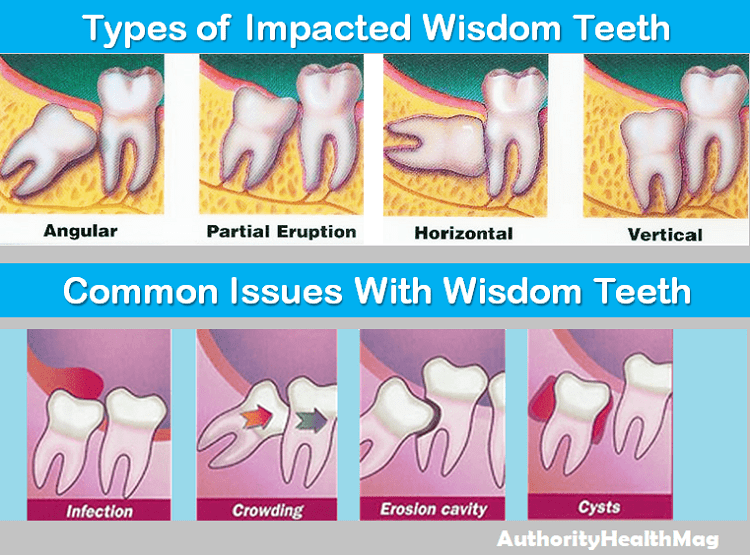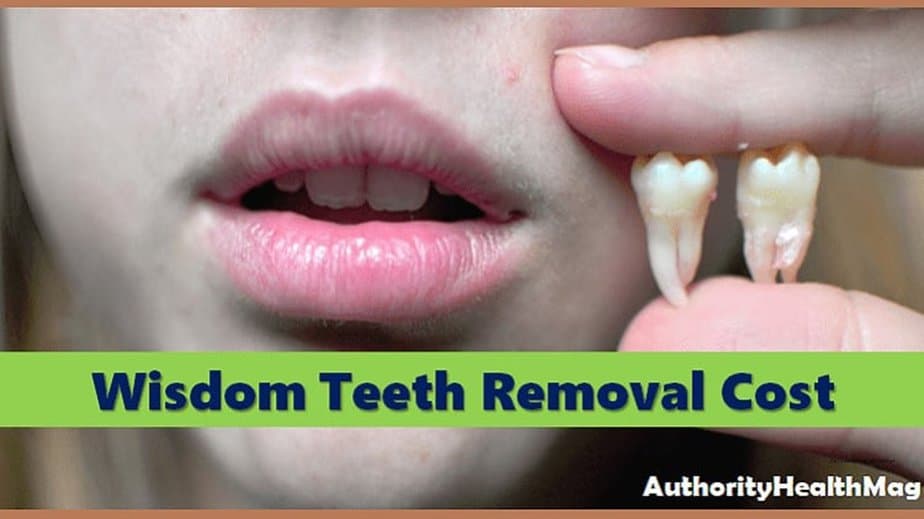For some people, the sprouting of wisdom teeth can create a flap of tissue that overlaps nearby molar teeth. In a few cases, wisdom teeth also grow incorrectly aligned, causing tooth pain and swelling in the gums. The extraction of such wisdom teeth is entirely unavoidable. And you may be interested to know about the cost of removing wisdom teeth and the medical procedures involved in it.
Wisdom teeth: an overview
Wisdom teeth are the last set of molars. They are each of the four hindmost molars in humans. This set of four teeth appears between the ages of 17 and 24. They are similar to the first permanent molars that erupt between ages 6 and 7.
According to a report published in Science Line, anthropologists believe wisdom teeth, or the third set of molars was the evolutionary answer to our ancestor’s early diet of coarse and rough foods like roots and leafy vegetables. These teeth evolved when humans required more chewing power and to resist the excessive wear and tear of teeth.
Why are the last four molars called “wisdom teeth”?
From the 1600s, the last four molar teeth were known as “teeth of wisdom.” But around AD 1850, dental practitioners popularized “wisdom teeth.” The last four molars do not grow until between 17 and 24. It is a period when we are considered adults and wise enough to manage life alone. The growth of the last four molars is a sign of a person’s maturity and wisdom.
These are the only teeth that develop after birth. The other 28 teeth, both primary and permanent, develop in the prenatal stage itself.
About 35 percent of people may not have the growth of wisdom teeth at all.
When should you remove wisdom teeth?
Wisdom teeth, or the third molars in the back of your mouth, must not be removed if fully erupted and positioned correctly.
Some people have impacted teeth; not enough room in their mouths for the new tooth to grow.
However, many people need more room in the gums to grow wisdom teeth properly. The tooth may grow at various angles or even horizontally in such cases.
Often, patients are given local anesthesia to suppress pain during the extraction of the tooth.

You have to get the wisdom tooth removed if the following conditions exist:
- The tooth remains fully hidden under the gums.
- If your teeth are trapped or impacted within your jaw, it may lead to infection or cysts.
- Only a partial portion of the tooth emerges through the gums.
- Crowding nearby teeth
According to the American Dental Association, wisdom teeth need removal if you experience any of the following bad oral health conditions around the erupted tooth:
- Frequent pain
- Gum disease
- Tooth decay
- Repeated infection of the soft tissues surrounding the tooth
- Fluid-filled sacs/cysts
- Tumors
- Damage to nearby teeth
Cost Of Wisdom Teeth Removal
How much does wisdom tooth removal cost?
The cost of extracting the third molar tooth varies according to the specific conditions of your tooth.
If your third molar fully erupts like the other molars, the cost would be as much as a normal tooth extraction.
A normal wisdom tooth extraction cost can vary anywhere from $75 to $200 per tooth. It is a non-surgical tooth extraction procedure that an experienced dentist or oral surgeon can perform.
However, the price of extracting a problematic wisdom tooth can be up to $400 or more, according to the condition of your tooth.
Tooth extraction costs can be high if your tooth is under conditions such as a tumor, cyst formation, impacted, or partially or fully hidden under the gums. The overall cost will be much higher for tooth removal surgery.
If the dental procedure includes sedation, the cost can range anywhere between $1000 and $1700. Normally, only general anesthesia is enough for most patients.
Let us look at the average cost of extracting wisdom teeth under various conditions.
Soft tissue impact
Some have wisdom teeth covered with an insignificant amount of soft gum tissue. Your dental surgeon must perform a minor operative intrusion to extract this tooth.
Removing wisdom teeth with soft tissue impact ranges from $200 to $400. Depending on the city and your dentist’s fees, the price of tooth extraction may be lower or higher than anticipated.
Partial bone impact
There are numerous cases of people with partially impacted wisdom teeth. It means that a portion of your tooth’s crown remains enclosed in your jawbone.
To remove a partially impacted wisdom tooth, your dentist will perform a surgical operation to cut open the gum. Additionally, it may involve the removal of some volume of the bony structure covering the tooth.
Removing a partially impacted wisdom tooth can cost you $250 to $450 per tooth.
Wisdom teeth that cause infection, cyst, tumor, bone decay, or damage to the adjacent tooth.
Your dentist must perform multiple treatment procedures to remove the wisdom tooth if it is causing severe conditions in the gum, jawbone, or adjacent tooth. Situations involving cysts, tumors, or infections need to be treated first before extracting the tooth.
When multiple treatments are to be done before or after the removal of a wisdom tooth, the cost of a medical procedure can be as high as $1,000.
Normal wisdom tooth removal
It will cost you a minimum of $75 and a maximum of $200 to remove one wisdom tooth. If you must remove all four wisdom teeth, you must pay fees ranging from $300 to $800.
How much does dental insurance cover pay?
Almost all dental insurance plans cover 40 to 60 percent of the cost of removing a wisdom tooth. Such insurance claims can only be made if the extraction of your tooth is medically necessary.
Some high-end dental insurance schemes pay up to $1,500 annually for all dental care. If you have such dental insurance coverage, you can easily get the full sum of the price charged for the removal of teeth.
Where can I find low-cost dental care?
If you cannot afford the high cost charged for dental care by most hospitals, you can look out for cheaper or free dental care service centers in your country.
At some dental clinics, the costs associated with wisdom tooth removal has payment option like structured payment plans or discount plan.
Almost all Asian, African, and Latin American countries offer affordable dental care.
In the U.S., you can get wisdom tooth removal at a cheap rate or for free in some dental service centers. Here is a list of a few such health institutions:
Local health departments
The Bureau of Primary Health Care supports federally-funded community health centers nationwide that provide free or reduced-cost health services, including dental care.
Medicare, Medicaid, and CHIP
The elderly (65 years and older) can get limited dental care under the Medicare insurance scheme. All eligible persons for medical treatments, including dental care, can avail themselves of Medicaid funds. CHIP provides medical insurance coverage to all eligible children and teenagers below the age of 19.
Dental schools
Dental schools (American Dental Association) can be an excellent source of affordable dental treatment.
Clinical trials
The National Institutes of Dental and Craniofacial Research (NIDCR) sometimes seek volunteers with specific oral, dental, and craniofacial conditions to participate in research studies. Some of these clinical trial centers offer free or subsidized dental care.
The final thought
Wisdom teeth, also known as “third molars,” are highly valuable. Since these teeth grow after 17 years, often little room is left in the gums for proper growth. Impacted wisdom teeth can cause many problems like pain, infection, and facial swelling. In such a situation, wisdom teeth must be removed surgically.
The cost of extracting a wisdom tooth depends on the condition of the tooth and the standard dental charges in a region or city. It will cost you a minimum of $75 and a maximum of $250 per tooth.
The average wisdom teeth removal cost in the U.S. is around $150. All four wisdom teeth removal typically costs around $600 minimum.
This service may cost much more if the procedure involves partial removal of gum and a portion of the jawbone trapping the tooth.
Recommended reading list:
